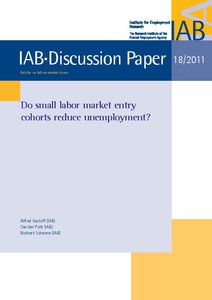Do small labor market entry cohorts reduce unemployment?
"In this paper we study the effect of small labor market entry cohorts on (un)employment in Western Germany. From a theoretical point of view, decreasing cohort sizes may on the one hand reduce unemployment due to 'inverse cohort crowding' or on the other hand increase unemployment if...
| Main Authors: | , , |
|---|---|
| Institution: | ETUI-European Trade Union Institute |
| Format: | TEXT |
| Language: | English |
| Published: |
Nürnberg
2011
IAB |
| Subjects: | |
| Online Access: | https://www.labourline.org/KENTIKA-19136555124919547379-Do-small-labor-market-entry-co.htm |
| Summary: | "In this paper we study the effect of small labor market entry cohorts on (un)employment in Western Germany. From a theoretical point of view, decreasing cohort sizes may on the one hand reduce unemployment due to 'inverse cohort crowding' or on the other hand increase unemployment if companies reduce jobs disproportionately. Consequently, the actual effect of cohort shrinking on (un)employment is an empirical question. We analyze the relationship between (un)employment and cohort sizes using a long panel of Western German labor market regions. In this context, we account for both the likely endogeneity of cohort size due to migration of the (young) workforce across regions using lagged births as instruments as well as for temporal and spatial autocorrelation. Our results provide good news for the (Western) German labor market: small entry cohorts are indeed likely to decrease the overall unemployment rate and thus to improve the situation of job seekers. Accordingly, with regard to the employment rate we find that it is positively affected by a decrease in the youth share." |
|---|---|
| Physical Description: | 32 p. Digital |

